As Maria clutched the eviction notice, her heart pounded a frantic rhythm against her ribs. The meager savings she’d hoarded, her “hedge” against life’s uncertainties, had evaporated in the face of a single medical emergency. This wasn’t just her story; it echoed across communities, a stark testament to the fragility of individual security in a world obsessed with personal “hedging.”
But what if true security lay not in walls built around ourselves, but in the woven fabric of a society that prioritizes collective well-being?
Imagine living in a world where you have everything you need to be happy and secure, but you are also aware that your well-being depends on the well-being of others and the planet. You are not alone, but part of a web of life that supports and sustains you.
You are not selfish, but generous and compassionate. You are not fearful, but hopeful and courageous. This is not a utopian fantasy, but a realistic possibility. It is the vision of a world where we embrace interdependence and societal well-being as the ultimate goal.
However, this vision is far from the reality we currently face. We live in a world where many people are driven by a “hedging” mentality, trying to secure their own financial security at the expense of others and the environment. This mentality is rooted in two flawed assumptions: anthropocentrism and individualism.

Beyond the Scarcity Mindset
Anthropocentrism is the belief that humans are the center of the universe and superior to other forms of life. It leads us to view nature as a resource to be exploited and dominated, rather than a partner to be respected and cherished. It also blinds us to the interdependence of all living beings and the consequences of our actions on the ecological balance.
The impact of anthropocentrism on our approach to financial security is evident in the growing environmental crisis and its connection to economic inequality.
According to the Intergovernmental Panel on Climate Change (IPCC), human activities have caused unprecedented changes in the Earth’s climate, leading to more frequent and severe extreme weather events, rising sea levels, melting ice caps, and loss of biodiversity.
These changes pose serious threats to human health, food security, water supply, and social stability. Moreover, the World Bank estimates that climate change could push more than 100 million people into poverty by 2030, especially in developing countries that are most vulnerable to its effects.
Individualism is the belief that each person is an independent and self-reliant entity, responsible for their own success or failure. It leads us to value competition over cooperation, consumption over conservation, and profit over people. It also isolates us from our communities and our common humanity, eroding our sense of belonging and empathy.
The detrimental effects of individualism on social cohesion and environmental sustainability are well-documented. Research by the World Health Organization (WHO) shows that income inequality is associated with higher rates of mortality, morbidity, mental illness, violence, and social unrest.
Similarly, studies by the Organisation for Economic Co-operation and Development (OECD) indicate that income inequality reduces trust, civic engagement, social mobility, and educational opportunities. As a result, individualism creates a vicious cycle of insecurity, anxiety, and alienation, undermining our collective well-being.
As Winona LaDuke, an indigenous leader and environmental activist, puts it: “We are not separate from the land, we are not separate from each other. The land is our mother, our ancestors, our culture, our history. The land gives us life. And we have a responsibility to care for the land as it cares for us.”

Shifting Focus: Interdependence and Wellbeing
To break free from the scarcity mindset and the hedging mentality, we need to redefine what security means to us. We need to go beyond individual financial security, and embrace a holistic concept of well-being that encompasses ecological, social, and spiritual dimensions.
We need to recognize that our well-being is not independent, but interdependent on the well-being of others and the planet.
Well-being is not a static state, but a dynamic process of flourishing and thriving. It is not a zero-sum game, but a positive-sum game. It is not a matter of having more, but of being more. It is not a matter of survival, but of fulfillment.
To achieve well-being, we need to build interdependence in our personal and collective lives. We need to foster a sense of connection, collaboration, and compassion. We need to learn from and support each other, share our resources and skills, and celebrate our diversity and commonality. We need to create a culture of generosity and gratitude, where we give and receive with joy and respect.
Also Read: How to Achieve a Healthy Balance Between Private Life and Work
There are many concepts and models that can inspire us to build interdependence, such as ubuntu, sumac qamaña (living well together), and commons-based economies. Ubuntu is a philosophy and way of life from Southern Africa that means “I am because we are”. It emphasizes the interconnection of all beings and the importance of dignity, harmony, and solidarity.
Sumac qamaña is a concept and practice from the Andean region that means “living well together”. It reflects the balance and complementarity of humans and nature, and the aspiration for collective happiness and harmony. Commons-based economies are systems of production and distribution that are based on shared ownership and management of resources, such as land, water, knowledge, and culture.
They promote cooperation, participation, and sustainability, and challenge the dominant paradigms of private property and market exchange.
As Margaret Mead, a renowned anthropologist and social activist, said: “Never doubt that a small group of thoughtful, committed citizens can change the world; indeed, it’s the only thing that ever has.”
Indigenous Wisdom and Sustainable Futures
One of the sources of interdependence and well-being that we can learn from is the wisdom and experience of indigenous peoples. Indigenous peoples are the original inhabitants of their lands, who have maintained their distinct cultures, languages, and traditions for generations.
They have a deep and intimate relationship with their territories and natural resources, and a rich and diverse knowledge of their environments and ecosystems.
They have also faced and resisted centuries of colonization, oppression, and marginalization, and have contributed to the struggles for human rights, social justice, and environmental protection.
One of the principles that guides indigenous peoples is reciprocity, which means giving and receiving in a balanced and respectful way.
Reciprocity is the basis of gift economies, which are systems of exchange that are not driven by profit or coercion, but by generosity and gratitude. Gift economies create bonds of trust and mutual obligation, and foster a sense of abundance and sufficiency. They also acknowledge the intrinsic value and sacredness of life, and the responsibility to care for and protect it.
Research by the International Labour Organization (ILO) and the United Nations Development Programme (UNDP) shows that indigenous peoples have successfully implemented community development projects based on reciprocity and resource sharing, such as community banks, cooperatives, and social enterprises . These projects have improved the livelihoods, well-being, and empowerment of indigenous peoples, and have also enhanced their resilience and adaptation to climate change and other challenges .
Another principle that guides indigenous peoples is ecological sustainability, which means living within the limits and cycles of nature, and prioritizing the health and integrity of the biosphere. Ecological sustainability is not only a matter of survival, but also a matter of ethics and spirituality.
It is based on the recognition that humans are part of nature, not apart from it, and that we have a duty to respect and protect the rights and interests of all living beings.
Ecological sustainability is essential for embracing interdependence and well-being, as it ensures the viability and vitality of the web of life that supports and sustains us. It also challenges the dominant models of development and growth that are based on exploitation and consumption, and that have led to the degradation and depletion of the natural resources and services that we depend on.
Beyond Hedging: Towards a Web of Wellbeing
We have seen that individual financial security is not enough, and that we need to embrace interdependence and societal well-being as the ultimate goal. We have also seen that this requires a radical shift in our mindset, values, and actions, and that we can draw inspiration and guidance from various concepts, models, and examples, especially from indigenous wisdom and practice.
But how can we make this shift happen? How can we move from hedging to interdependence, from scarcity to well-being, from survival to fulfillment?
Call to Action: Let’s dismantle the walls of scarcity and cultivate the garden of interdependence. In our daily lives, we can support local businesses, volunteer in our communities, and advocate for policies that prioritize social justice and environmental sustainability. We can learn from indigenous wisdom, embrace reciprocity, and build commons-based initiatives. Together, we can weave a web of well-being where individual prosperity is not a solitary peak, but a flourishing thread in the tapestry of a thriving Earth.
Hope and Transformation: This path towards interdependence may seem daunting, but the seeds of change have already been sown. Community gardens bloom in concrete jungles, cooperatives challenge corporate giants, and movements for social and ecological justice gather momentum. Let us nurture these seeds, water them with hope, and watch them blossom into a future where well-being is not a privilege, but a birthright woven into the very fabric of our existence.